
by Purnima Ramakrishnan | Dec 2, 2013 | Award, Childhood, Competition, Education, India, Inspirational, International, Kids, Life Balance, Life Lesson, Motherhood, Parenting, Purnima, The Alchemist, World Moms Blog, World Motherhood, Younger Children

“Education is the manifestation of the perfection already in man – Swami Vivakananda”
Sometime back I wrote about Abraham Lincoln’s letter to his son’s school teacher and my perspective and how it was appropriate for our lives here too. To bring up a good human being and to help him/her learn and get educated is the role of the parent and also the teacher at school.
Well, there were these competitions going on in my seven year old son’s school again, here, in India. This time it was Western Music. I am so fond of these musicals. My son sang some of my favorites and then Que Sara Sara and Rudolph the red nosed reindeer. He continued to the preliminaries, quarter finals, semi-finals and the finals. But one day while preparing for the finals at home, my son suddenly said, “Not all are going to win.”
I said, “Yes, they are not. But if you want to win, you need to practise.”
He was not the type of person who was interested to sing, but the type who loved to listen to music and songs. And I discovered this during this time.
“But amma, I don’t care.”
“Well, you should do your best. And then if you don’t get to win, that is fine. But you should not just give up.”
“I am not giving up. I just don’t want to sing.”
“Oh?”
Well, I was at a loss of words. I did not want him to do something he did not want to do. But then we were already into the finals, and I thought was it not a sheer waste if he did not even participate? This got me thinking…
The next day I found this quote in his school’s website.
Education is the manifestation of the perfection already in man – Swami Vivakananda.
We send our children to school for education and the teachers and parents are loving and affectionate and try to encourage the children to imbibe knowledge.
But then, what do they actually learn? Only what they chose to!
And also, sometimes they don’t learn and at other times they are very smart in academics. They also indulge in sports and other extra-curricular activities. We are happy, sometimes sad, and at times indifferent to various achievements, successes and failures and mediocre performances of our children. So many choices, actions, results, and yet Swami Vivekananda says we are all perfect.
If everyone is perfect, then where are the gaps? Why do only some people win? Why are there so many differences and scales of grades? ‘Manifestation’ is the significant word. What manifests out of a child is important. And whatever manifests, the society, the parents and the teachers are responsible to some extent. And then the children themselves are finally responsible. We bring up a child, giving him a lot of room to explore, think, discover and find joy, and, thereby, allow him to manifest his perfection.
I did not ask him to practise a lot for the singing competition. If he is not interested, let him not be. Maybe he is interested in building robots. Maybe he is interested in literary pursuits. Maybe he is interested in astronomy when he points out the pole star and Venus.
Because he is talented to sing, does not mean he should want to do it or become the next pop star. Whatever he allows to be manifested from himself, only will be, and I cannot force it.
And the reason for what he focuses on, no one can understand. It is his own mind acting under his own will and there are no explanations for that. So, let me not put a restraint to the manifestation of his perfection. Let him lay down his own options and channel his own interests.
In the end, he did end up participating in the finals, but without practising and the results are not out! But I shouldn’t care about the results because he doesn’t, right?
Is your child exercising independence in what he wants to do in life and what he wants to achieve? If so, are they different from what you think? And how do you handle it?
This is an original post to World Moms Blog by Purnima, our Indian mother writing from Chennai, India. Her contributions to the World Moms Blog can be found here. She also rambles at The Alchemist’s Blog.
Photo credit to Wiki Media Commons.

by World Moms Blog | Nov 25, 2013 | 2013, Body Image, Child Care, Childhood, Communication, Cultural Differences, Education, Eye on Culture, Family, Guest Post, Kids, Language, Life Balance, Motherhood, Parenting, Preschool, Relationships, School, Sex, Sexuality, Traditions, Uncategorized, Women's Rights, World Events, World Interviews, World Mom Feature, World Moms Blog, World Motherhood, Younger Children
 My neighbours in the Netherlands just had a baby and have proudly decorated their window with pink balloons and a garland saying: ”Hooray, a girl!”
My neighbours in the Netherlands just had a baby and have proudly decorated their window with pink balloons and a garland saying: ”Hooray, a girl!”
This would probably be shocking to a new category of Swedish parents, who refuse to reveal the sex of their baby to family and friends as well as to daycare staff. The baby is given a gender-neutral name, and will be dressed in anything but pink and light-blue.
Why? The parents don’t want their child to be subjected to society’s division of human beings into male and female, claiming that the stereotypes linked to it limit the child’s freedom.
While this remains rather rare, there is a rapidly increasing number of preschools in Sweden where gender equality is the main ideological and educational basis.
In these schools, the staff strives to treat girls and boys equally in all respects. They don’t hide the fact that both sexes exist, but don’t make a point of it and won’t encourage the children to play and behave in a way that is typical for their sex. They won’t call them girls and boys, but refer to them as ”friends” or ”children”.
Conveniently enough, a new pronoun is making its way into the Swedish language: ”hen”, meaning both ”he” and ”she” (”han” and ”hon” in Swedish). When the practice of using ”he” for both sexes in law texts was changed to the more cumbersome ”he or she”, texts became difficult to read and people started looking for other solutions.
The idea of ”hen” comes from the Finnish language (although Finnish is completely different from Swedish; its closest relative among European languages is Hungarian), which uses the pronoun ”hän” for both sexes. Apart from being used in texts to increase readability, the Swedish pronoun ”hen” is now used by advocates of gender neutrality.
The new pronoun and gender-neutral preschools are hot topics in Sweden right now. An increasing number of people like and make use of them, but a big part of the population is very critical towards them.
Sweden is one of the leading countries when it comes to gender equality. Thanks to the important work that has been done in this regard, women and men now basically have the same opportunities in all areas of life.
When gender equality turns into gender neutrality, however, are we still going in the right direction? Isn’t there a risk that gender-neutral treatment introduces another type of prejudice? When girls behave in a traditionally girly way, and boys behave in a traditionally boyish manner, will this be happily accepted or will they feel that their behaviour is wrong? Will there be a new ideal of tough girls and soft boys, as some critics fear?
How will children develop when their parents actively try to conceal what sex they are? Will they think that it’s bad to be a boy or a girl? Will they revolt against their upbringing and shower their own daughters with princess stuff, and their sons with cars and toy guns? Or will these children simply be freer and more unprejudiced than those who grow up in more traditional families, and contribute to a positive change in society?
Time will show.
What are you thoughts on this modern, Swedish approach to gender equality?
Kristina was born in Hamburg, Germany, but moved to Sweden at the age of 8 (her mother is German, her father Swedish). She studied French and linguistics and works as a translator. At the moment she lives in the Netherlands with her French husband and their two daughters, aged 17 months and 4 years. Kristina is interested in psychology and right now particularly focuses on child and family psychology. Working three days a week and being a full-time mom the remaining days, she doesn’t find as much time to read, write and practice yoga and music as she would like, but appreciates her early mornings in trains. There is nothing like contemplating an awakening landscape from a train with a cup of hot chocolate.
The image used in this post is credited to Jonathan Stonehouse. It holds a Flickr Creative Commons attribution license.
World Moms Blog is an award winning website which writes from over 30 countries on the topics of motherhood, culture, human rights and social good. Over 70 international contributors share their stories from around the globe, bonded by the common thread of motherhood and wanting a better world for their children.
World Moms Blog was listed by Forbes Woman as one of the "Best 100 Websites for Women 2012 & 2013" and also called a "must read" by the NY Times Motherlode in 2013. Our Senior Editor in India, Purnima Ramakrishnan, was awarded the BlogHer International Activist Award in 2013.
More Posts

by Meredith (USA) | Nov 22, 2013 | Childhood, Communication, Kids, Life Lesson, Motherhood, Music, Parenting, World Motherhood, Younger Children

The past few months, I have been listening to a few songs which have really “spoken” to me. The first one is Katy Perry’s “Roar”. It just makes me want to stand up and really tell people what I really think instead of what I think is the polite thing to say. The second song, “Brave” by Sara Bareilles, says so eloquently what my inner self has been whispering to me for years…“I just want to see you be brave.”
Growing up, I went to Catholic school, and I was always taught to not draw too much attention to myself, and to always make everyone feel welcome. I always remember feeling that I should agree with what the majority said because my own ideas weren’t as good as the others. After all, who would want to listen to a gawky junior high girl?
As I got older, those traits seemed to stay with me to the point that I think I would go out of my way to please others because the thought of someone being upset with something I had said or done was too much for me to handle. I started to feel like no one really knew who I was because I had built up so much of a false identity trying to make other people happy when deep down I was unhappy because I was too afraid to be true to myself and tell others what I was really thinking.
In the last few years, I have started to realize I do have my own voice and my own opinions to share with others and my fear of disappointing or making others upset is dissipating. That may sound silly to someone who has never had any trouble speaking her mind, but for me, it is a huge deal.
Now that I have my own children, I often wonder if messages I am giving them (sometimes unintended) could cause them to feel the same way. I find myself telling them that they don’t have to be just like everyone else, but when we have friends over for dinner with their children and the kids have a disagreement with a friend over what to play together, I tell them that they should play what the other friend wants and then try to take turns.
Often times, we will go to another friends’ home and the children in that home are allowed to do many things that my children are not allowed to do. I find them coming to me and whispering to me about things that are happening, and I can only tell them that it is not acceptable for them to do those things. They observe the other parent saying nothing to their child. I know they don’t quite understand how I have one standard for them and another for other children.
I have always told my children not to tell a lie. So, when my daughter opened her present from a friend at a third birthday party and declared in front of everyone that she didn’t like it, I should have been proud, right? Or when my son told my Father-in-Law he was “fat”, I should have been proud of him for not lying, right? Embarrassed was more the feeling that was engulfing me at that moment. Cue the talk about the “little white lie” to my children so that we don’t hurt another person’s feelings with words we may say to them.
Are these “mixed messages” going to cause my own children to be afraid to speak their own minds and afraid to stand up to what they see is wrong? I guess only time will tell. I just keep hearing the words from Katy Perry’s song in my head, “I stood for nothing so I fell for everything.” I look back at my own life and how I am just now seeing how important it is to stand up for yourself. I guess it is all a learning experience. Along the way, we have to decipher the mixed messages until we come to our own conclusions of what is wrong or right from what we have been taught along the way.
I wish I could make it so simple for my children and tell them that when they speak their own mind and are true to themselves that they will always be accepted no matter what. But the truth is, they may not be accepted. And, isn’t that what true bravery is? Bravery to stand up for what they believe in is really what I want for my children. Being brave and true to oneself is what leads to ultimate happiness. I hope it won’t take them as long to figure out not to be scared of what others may think, but if it does that’s fine, too. My hope for them is that they do figure it out because it would be such a shame for the world not to know the bright, kind and brave souls that they truly are.
How do you teach your children to stand up for what they think?
This is an original post for World Moms Blog by Meredith. You can read more about her life as an expat in Nigeria and her transition back at www.wefoundhappiness.blogspot.com.
Meredith finds it difficult to tell anyone where she is from exactly! She grew up in several states, but mainly Illinois. She has a Bachelor of Science degree in Elementary Education from the University of Illinois at Champaign/Urbana which is also where she met her husband. She taught kindergarten for seven years before she adopted her son from Guatemala and then gave birth to her daughter two years leter. She moved to Lagos, Nigeria with her husband and two children in July 2009 for her husband's work. She and her family moved back to the U.S.this summer(August 2012) and are adjusting to life back in the U.S. You can read more about her life in Lagos and her adjustment to being back on her blog: We Found Happiness.
More Posts

by Tinne from Tantrums and Tomatoes | Nov 11, 2013 | 2013, Being Thankful, Belgium, Childhood, Competition, Contest, Education, Family, Girls, Husband, Life Lesson, Parenting, Relationships, Siblings, Tantrum and Tomatoes, World Motherhood, Younger Children
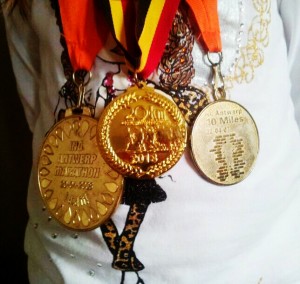 There is no denying that my eldest child is competitive.
There is no denying that my eldest child is competitive.
Fiercely competitive.
The kind which makes for a future Olympic-Gold-Medal winner – competitive.
She needs to be first. Perhaps it has something to do with the fact that she is the oldest, but I suspect it is just part of her genetic make up.
Her father has the same drive to always do better than the rest, to drive himself towards new goals, to be better, faster, to force his body into running a marathon and to try to improve his time again and again and again. And he is willing to suffer for it, to endure muscle cramps, to run until his energy levels have been completely depleted and he is more dead than alive.
I’m not like that, neither is n°2. We are happily just pottering about, going about our business and we will get there in the end. So what if it takes us hours, weeks or months. So what if we don’t finish first. We ran, didn’t we? We did our part. Besides I do not like discomfort, mentally or physically.
Like so many characteristics, my daughter’s competitiveness is a two sided sword.
It is what drove her to learn how to ride a bike without training wheels in just two days, simply because a boy in her class could do it and if that boy could do it then there was no reason why she shouldn’t be able to as well.
It got her out of diapers so quickly simply because her friend was also potty training and she wanted to be first.
But there is a downside as well. Being only four, she aims to be first in just about everything she does. And I really do mean e-ve-ry-thing . Whether it is rolling in the dust, dressing herself, putting olives on a pizza, eating said pizza, learning how to count to 20, spelling out her own name AND that of mommy, to her it is a competition. She will try to ‘win’ at it, do a victory dance when she ‘wins’ and be inconsolable when she doesn’t.
There have been many conversations about how winning is nice but not so important that you need to bawl your eyes out when some other kid takes the prize and that she cannot always be first. That is OK not to always win, not to be top in everything and that there are some things, that I’m sorry my dear darling, you will not be able to do.
This – I have to admit – will be a though lesson for her to learn. And she will have to learn it, otherwise she’ll be a pill-popping, nervous wreck by the time she is 16.
And she will have to find a way to turn that competitiveness into something positive.
But there is the glitch in the whole affair. How will she learn?
Through experience? Will it just click one day? Will she simply just realize that she is not musical (she has inherited my signing voice, which sounds like a chorus of warthogs high on helium), that she cannot really jump that high. Will she be sad, will she cry, will she regret it her whole life or… will she just simply accept. Accept that yes, she sucks at music, dancing, mathematics, but hey, she has a knack for drawing awesome portraits and makes a killer brownie, so what the heck …
How did you or your child come to terms with the fact that there is something that you or s/he just is not good at?
This is an original post to World Moms Blog from our mother of two in Belgium, Tantrums and Tomatoes.
Born in Belgium on the fourth of July in a time before the invention of the smart phone Tinne is a working mother of two adorably mischievous little girls, the wife of her high school sweetheart and the owner of a black cat called Atilla.
Since she likes to cook her blog is mainly devoted to food and because she is Belgian she has an absurd sense of humour and is frequently snarky. When she is not devoting all her attention to the internet, she likes to read, write and eat chocolate. Her greatest nemesis is laundry.
More Posts - Website
Follow Me:


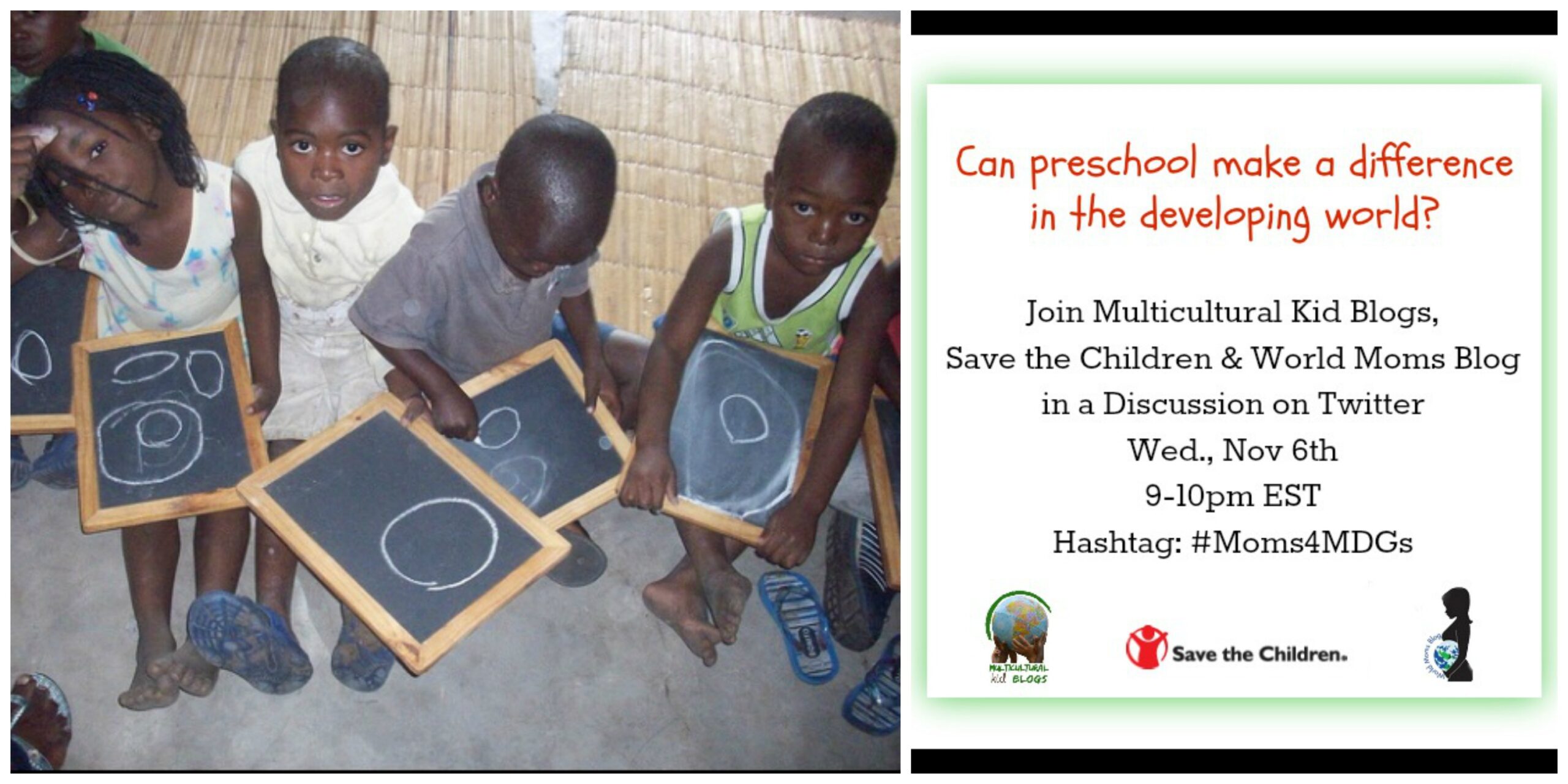
by Elizabeth Atalay | Nov 5, 2013 | 2013, Childhood, Education, Social Good, World Voice, Younger Children
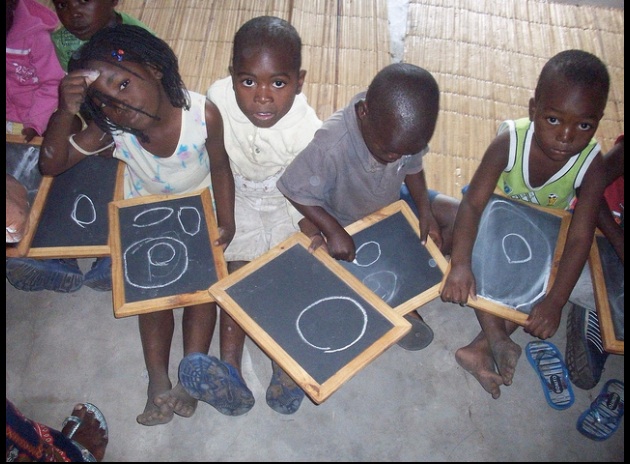
Photo Credit Save The Children
Where I live it is a given that most parents will send their kids to pre-school, some as young as two years old. It is common belief that early education builds a strong foundation for future learning, and we take for granted that our kids will go on to higher education. In other areas of the world where food security, clean water, sanitation and extreme poverty are primary concerns, education can be a luxury. In some cases in these areas it is not uncommon for an older child to begin formal primary education for the first time creating classrooms of mixed ages.
Back in 2008, a $1 million donation from the 2007 Idol Gives Back television special, helped to build escolinhas or preschool centers targeting orphans and vulnerable children for Save the Children‘s program in Mozambique. Since then the program has reached about 5,000 three to six year olds and their families, and it continues to run with the help of trained volunteers from rural communities.
Children in developing countries, like Mozambique, who attend early childhood development programs are more likely to enroll in school and enter school at the right age. This is important because children who are over-age for their grade level are more likely to drop out, so early childhood development programs actually increase the chances that children will stay in school longer.
Due to the success of the preschool centers Save The Children was able to continue to find funding, and recently the progress seen in the area caught the eye of the Government of Mozambique, resulting in the implementation of similar early childhood education programs throughout the country.
A new World Bank evaluation shows early childhood programs help children thrive and learn more in rural Africa. The recently released , is good news for children and families in Africa.-Save The Children
In a country where most inhabitants live in rural interior areas that are prone to “hungry seasons” of flooding or drought, kids enrolled in early childhood development centers benefit from access to health care and interventional care such as deworming, malaria prevention, nutritional support or social welfare.
Investment in early childhood development can provide the greatest return, and the results from these Early Learning Centers are proof. It is important to reach kids before it is too late, before they have dropped out of school, or grown up without reaching their full potential. Development aid and countries have the opportunity to make a lasting difference in health outcomes, economic productivity, and educational opportunities by investing more human and financial resources into early childhood development programs.
To find out more about early education and Save The Children’s program in Mozambique join us tomorrow night, Wednesday November 6th from 9-10pm EST for a #Moms4MDGs twitter party with Save the Children, Multicultural Kids Blogs and World Moms Blog! Hope you can make it!
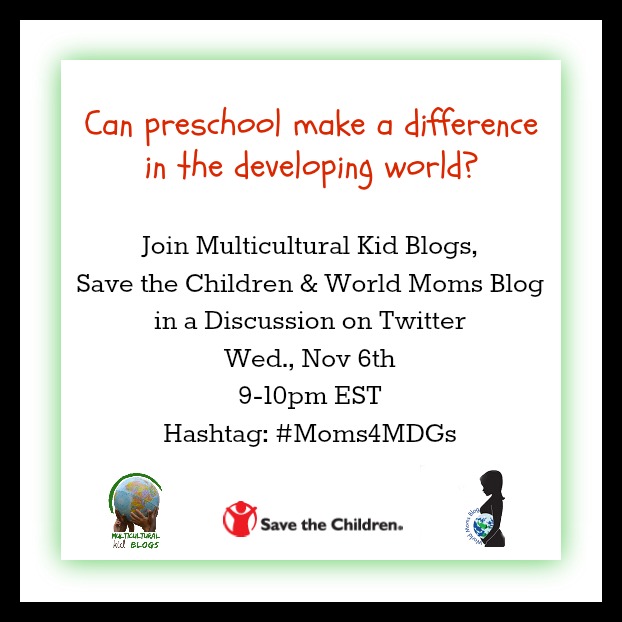
This is an original post written by Elizabeth Atalay of Documama for World Moms Blog.

Elizabeth Atalay is a Digital Media Producer, Managing Editor at World Moms Network, and a Social Media Manager. She was a 2015 United Nations Foundation Social Good Fellow, and traveled to Ethiopia as an International Reporting Project New Media Fellow to report on newborn health in 2014. On her personal blog, Documama.org, she uses digital media as a new medium for her background as a documentarian. After having worked on Feature Films and Television series for FOX, NBC, MGM, Columbia Pictures, Warner Brothers, 20th Century Fox, and Castle Rock Pictures, she studied documentary filmmaking and anthropology earning a Masters degree in Media Studies from The New School in New York. Since becoming a Digital Media Producer she has worked on social media campaigns for non-profits such as Save The Children, WaterAid, ONE.org, UNICEF, United Nations Foundation, Edesia, World Pulse, American Heart Association, and The Gates Foundation. Her writing has also been featured on ONE.org, Johnson & Johnson’s BabyCenter.com, EnoughProject.org, GaviAlliance.org, and Worldmomsnetwork.com. Elizabeth has traveled to 70 countries around the world, most recently to Haiti with Artisan Business Network to visit artisans in partnership with Macy’s Heart of Haiti line, which provides sustainable income to Haitian artisans. Elizabeth lives in New England with her husband and four children.
More Posts

by Karyn Wills | Nov 4, 2013 | Being Thankful, Brothers, Childhood, Family, Family Travel, Friendship, Home, Inspirational, Kids, New Zealand, Older Children, Parenting, Relationships, Siblings, Traditions, Travel, Uncategorized, Vacationing, World Motherhood, Younger Children
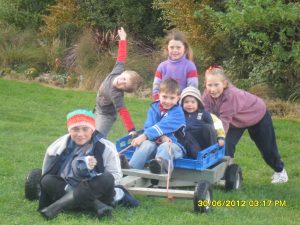 I have three sons and they are a lot of fun. They are also a lot of noise, mess and busyness.
I have three sons and they are a lot of fun. They are also a lot of noise, mess and busyness.
They adore one another most of the time and loathe one another at other times. Needless to say, living in a small house can get a little hectic and the fact that we live a car trip away from most of the boys’ friends—and I don’t always want to drive to fetch or deliver children—means that, from time to time, my boys can have a little too much of one another.
We are one small family and that can make us all tiresome to one another – no matter how strong the love between us.
The healthiness of living in an isolated, nuclear family unit has always bothered me a little. Not that living with my extended family or my in-laws would suit me, or them I suspect, either. But the cousins. Oh my goodness. The wonder of having cousins around – that appeals to me.
With cousins there is the common bond of grandparents and other family members, and the common history and the common family rituals. There is the emotional connection of knowing they all belong together, and the emotional connection of having been all together for their life times.
But, what I really love is the bond I see between our boys and all of their cousins in terms of visible affection and loyalty. When we have been away on holiday together, older cousins have often taken our boys off for adventures or have played with them, especially as babies and toddlers, so I could have a break. Younger cousins provide opportunities for my older boys to teach and help, in their turn. Sometimes it’s just fun to hang out together.
With their cousins, my boys are learning that things their brothers have said to them repeatedly, and they have ignored, are often the same opinions of others – and their cousins are not afraid to tell them so, sometimes bluntly. They are learning a higher level of co-operative skills and greater negotiation techniques, than they get to use with just two others. They are learning to walk away, when they need to walk away, and they are learning when it is appropriate to comment on another’s behaviour and when it is best to stay silent.
Like their brothers, their cousins love them. Unlike their brothers, their cousins are listened to. Like their friends, their cousins enjoy playing with them and will tell them to go away, when they‘ve had enough – but only for a short while. Unlike their friends, they cannot be transient members of their lives. And that last point, in particular, I love.
Do your children have good relationships with their cousins? Do you see a deeper bond between your children and their cousins, than with their friends?
Karyn is a teacher, writer and solo mother to three sons. She lives in the sunny wine region of Hawke’s Bay, New Zealand in the city of Napier.
More Posts






















